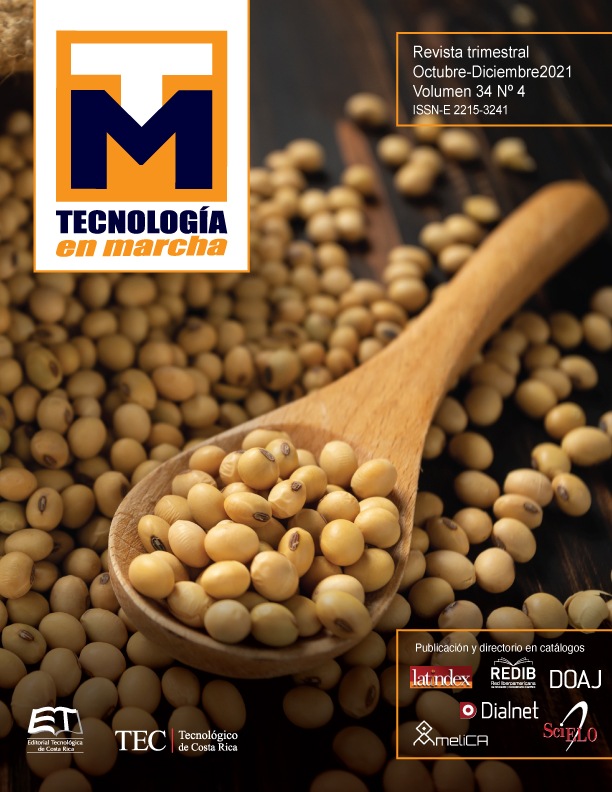Material flow analysis of solid waste in the district of Guápiles
Main Article Content
Abstract
Material Flow Analysis is a powerful tool, first time used in Costa Rica, to analyze the problems related to solid waste management in the district of Guápiles, in the province of Limon, Costa Rica. It is an analytical method to quantify flows and stocks of materials or substances in a well-defined system, allowing the visualization of solid waste and the actors involved in the process. The methodology used for the investigation was the characterization of residues of one hundred four houses and forty-nine shops, taking as reference the “Guide of interpretation of the methodology for the realization of studies of generation and composition of ordinary waste” of the CYMA program of the year 2012. In addition, surveys were conducted in the residential and commercial sector, as well as interviews with solid waste managers of the municipality of Pococí, and companies that collect recyclable materials and private collectors. Additionally, the analysis of materials received from the waste recovery campaigns for recycling. With this analysis, it was possible to identify the total amounts of solid waste being burned (283.80 tons / year), burials of organic matter (1 204.89 tons / year), glass burials (4.71 tons / year), recovery of solid waste for recycling, including less common flows such as electronic waste and metal scrap (2 115.35 tons / year). Furthermore, it was found that 7 408,04 tons / year had gone to Los Laureles sanitary landfill, and 1 225,44 tons/ year of illegal dumping. It was concluded that this tool could be used when making decisions in relation to the improvement of solid waste management systems.
Article Details

This work is licensed under a Creative Commons Attribution-NonCommercial-NoDerivatives 4.0 International License.
Los autores conservan los derechos de autor y ceden a la revista el derecho de la primera publicación y pueda editarlo, reproducirlo, distribuirlo, exhibirlo y comunicarlo en el país y en el extranjero mediante medios impresos y electrónicos. Asimismo, asumen el compromiso sobre cualquier litigio o reclamación relacionada con derechos de propiedad intelectual, exonerando de responsabilidad a la Editorial Tecnológica de Costa Rica. Además, se establece que los autores pueden realizar otros acuerdos contractuales independientes y adicionales para la distribución no exclusiva de la versión del artículo publicado en esta revista (p. ej., incluirlo en un repositorio institucional o publicarlo en un libro) siempre que indiquen claramente que el trabajo se publicó por primera vez en esta revista.
References
L. Abarca-Guerrero, G. Maas, and W. Hogland, “Desafíos en la gestión de residuos sólidos para las ciudades de países en desarrollo Solid waste management challenges for cities in developing countries.”
P. B.-T. Daniel Hoornweeg, “What a waste: A Global Review of Solid Waste Management,” J. Med. Soc. Toho Univ., vol. 58, no. 3, p. 209, 2011.
D. Ben-Haddej, A. Buchenan, A. Owen, and G. Shakan, “2010-2011 Managing Costa Rica’s Waste Recommendations for a Municipal Solid Waste Management Plan,” 2010.
P. HBrunner and H. Rechberger, “Practical Handbook of Material Flow Analysis.”
“Ley para la Gestión Integral de Residuos.”
D. De, F. Operativa, and Y. Evaluativa, “División de Fiscalización Operativa y Evaluativa Área de Fiscalización de Servicio para Desarrollo Local,” 2016.
M. Del, C. Pococí, S. Del, and C. Pococí, “Reglamento para la gestión integral de residuos sólidos de la Municipalidad de Pococí,” pp. 1–34, 2019.
C. Zurbrügg and F. D. I. Ingegneria, Assessment methods for waste management decision-support in developing countries.
L. S. dos Muchangos, A. Tokai, and A. Hanashima, “Application of material flow analysis to municipal solid waste in Maputo City, Mozambique,” Waste Manag. Res., vol. 35, no. 3, pp. 253–266, 2017.
“Material Flow Analysis for Environmental Sanitation Planning in Developing Countries.”
INEC. (Instituto Nacional de Estadística y Censo). 2011. Indicadores demográficos, sociales según provincia, cantón y distrito. Accesado junio, 2019. [En línea]. Disponible en: http://www.inec.go.cr/censos/censos-2011?keys=&at=632&prd=All&field_anio_documento_value%5Bvalue%5D%5Bdate%5D=2011
Inder. (Instituto de Desarrollo Rural). Accesado junio, 2019. [En línea]. Disponible en: https://www.inder.go.cr/territorios_inder/index.aspx
CYMA, “Guía de interpretación de la metodología para la realización de estudios de generación y composición de residuos ordinarios Guía de interpretación de la metodología para la realización de estudios de generación y composición de residuos ordinarios.” 2012.
Y. S. L. Martin Kajokare Karija, QI Shihua, “The Impact of Poor Municipal Solid Waste Management Practices and Sanitation Status on Water Quality and Public Health in Cities of the Least Developed Countries: the Case of Juba, South Sudan,” Int. J. Appl. Sci. Technol., vol. 3, 2013.
M. Bobeck, “Organic Household Waste in Developing Countries An overview of environmental and health consequences, and appropriate decentralised technologies and strategies for sustainable management,” no. June, 2010.
S. Vassanadumrongdee and S. Kittipongvises, “Factors influencing source separation intention and willingness to pay for improving waste management in Bangkok, Thailand,” Sustain. Environ. Res., vol. 28, no. 2, pp. 90–99, 2018
P. Gerdes and E. Gunsilius, “The Waste Experts: Enabling Conditions for Informal Sector Integration in Solid Waste Management,” p. 32, 2010.
C. Thomas and V. Sharp, “Understanding the normalisation of recycling behaviour and its implications for other pro-environmental behaviours: A review of social norms and recycling,” Resour. Conserv. Recycl., vol. 79, pp. 11–20, 2013.
R. Campos-Rodríguez and S. Soto-Córdoba, “Estudio de generación y composición de residuos sólidos en el cantón de Guácimo, Costa Rica,” Rev. Tecnol. en Marcha, vol. 27, no. 3, p. 122, 2014.

